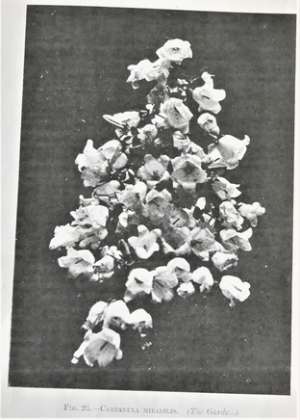Inhoud
mirabilis
Campanula mirabilis
Albov./Alboff.
Infrageneric Taxa
Fam. des Campanulacées. Section 1: Calice accompagné d'appendices foliacés. Groupe 2: - 3 stigmates, capsule á 3 loges1)
Names
Fr.: Campanule admirable
Habitus
Cette espéce, récemment introduite dans nos régions et provenant du Caucase occidental, est surtout remarquable par son port pyramido-conique, sa ramification trés dense et la profusion de ses larges fleurs, d'un coloris lilas pále, sous lesquelles disparaissent tiges, rameaux et feuilles.2)
Habit branching; foliage shining;flowers blue. It must be propagated by seeds. (Fig.26).3)
Monocarpic, much-branched, to 1 ft.
Leaves
Rosette leaves ovate, serrate, smooth, glossy, petioles winged, to about 6 in. long, stem leaves reduced, the uppermost clasping. Flower stems erect.
Flowers
Flowers ascending, 1-4 on short, axillary brs., calyx with appendages, ciliate, corolla pale lilac-blue, to 2 in. across, campanulate.
Fruit
Species actually grown or used for breeding 4)
Varieties
* Campanula mirabilis var. albiflora
Origin
Caucasus
Use
A new species of great beauty, but not a perennial dying after flowering. Report says that the collector Alboff believed the specimens he discovered at an altitude of 10,000 feet in the Caucasus were the last existing plants, but through Herr Max Leichtlin's exertions it is now pretty well distributed. Habit branching; foliage shining;flowers blue. It must be propagated by seeds. (Fig.26).5)
On n'est pas encore fixé sur ses exigences, en tout cas elle est d'une culture assez difficile; les jeunes plants doivent étre hivernés sons chássis.6)
Living
Mit Campanula mirabilis habe ich bisher wenig Erfolg gehabt. Die Pflanzen faulen haufig noch kurz vor der Blute am Hals der dicken Wurzel 7).


